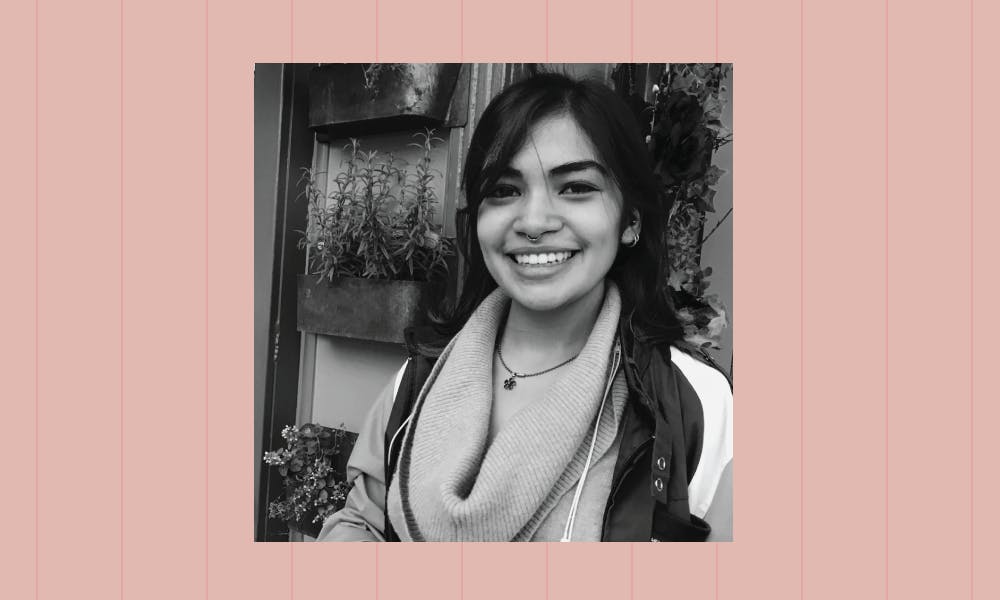On Tuesday night, a group of students came together in Harnwell’s Rooftop Lounge to learn more about the Coalition Against Fraternity Sexual Assault (CAFSA)—an organization that had previously been anonymous.
Four CAFSA board members were present to engage with Penn’s students and open up about their mission. Among these students was first–year Gabriela Alvarado (C '23).
Gabriela is planning to double–major in Latin American & Latino Studies and Health & Societies. She’s a Civic Scholar focusing on service learning. Although she joined CAFSA during her first semester at Penn, she's going public about it now.
CAFSA's mission revolves around issues of sexual assault and racial inequality, particularly focused on Greek life. A current goal of the organization is to replace the fraternities on Locust Walk with cultural centers and wellness spaces. But Gabriela dispels the assumption among some that the organization is anti–fraternity.
“We’re not against Greek life. We’re for survivors,” she says.

After coming to campus this fall, Gabriela joined CAFSA’s board because of her passion for activism.
“I met someone who helped to organize the core people involved [in CAFSA]. Basically, I was thinking, ‘Man, I hate the way that Locust is right now,’” she explains.
Last semester, Gabriela was involved in two main CAFSA protests. The first was in front of the button.
“It was like drizzling just barely, but I was standing there, I can’t remember, maybe two hours," she says. "So, I was soaked. There weren’t a lot of people there, but we did get a lot of people come to talk to us."
On top of that, the signs they’d been holding got so wet that the red ink on the signs bled, creating an unintentionally ominous look.
"There’s a lot of work that needs to be done," she explains. "There’s a lot of work that needs to be done administratively to organize these protests."
She ended up being one of the few CAFSA board members who revealed their identity last Tuesday at the town hall. The goal was to answer questions from Penn students and hear new ideas.
But coming out with their identities wasn’t an easy decision to make.
“I think there’s been a lot of fear within our group," Gabriela says. "We were verbally intimidated by people in the administration. That’s why a lot of our board members remain anonymous, and I very strongly support that."
“For me, I guess my parents just taught me to stand up for what I believe in … Someone needs to stand up and say, ‘That’s not okay.’ And being anonymous is important, but at a certain point it impedes progress. If someone has to put their face to it, then I’ll do that.”
CAFSA wasn’t the first activist group that Gabriela’s been a part of. She was involved in leadership and activism throughout high school in her hometown of Sacramento, California.
“I went to this leadership program called Chicano Latino Youth Leadership Project. We went to the Capitol building [in Sacramento], went to the Senate floor, did mock–lobbying. It was really cool. I think the main takeaway that I got from that was be proud of your identity.”
She joined during Trump's presidential campaign and the rise of a movement that demonized immigrants in general and Mexicans in particular.
"The word ‘Mexican’ became a bad word. It became an insult," she says. “If someone asked me, ‘Are you Mexican?’ I would say no.”
The leadership program helped her realize her identity wasn’t an insult. She started a group called the Chicanx Latinx Student Union in her high school and wrote a proposal to have a mandatory ethnic studies class. Her work as an activist brought her into the Civic Scholar program at Penn.
Her activism hasn't stopped now that she's at Penn, either. Through her work, she's already learned something about the power individuals have to enact change.
“We’ve gotten some alumni response saying, ‘I wish I had done this when I was here. I wish this group had formed when I was here.’ Things like that. And I’m really happy about that," she says. "But like, you should have done it."
"If you see something’s wrong, you don’t have to stand by.”







